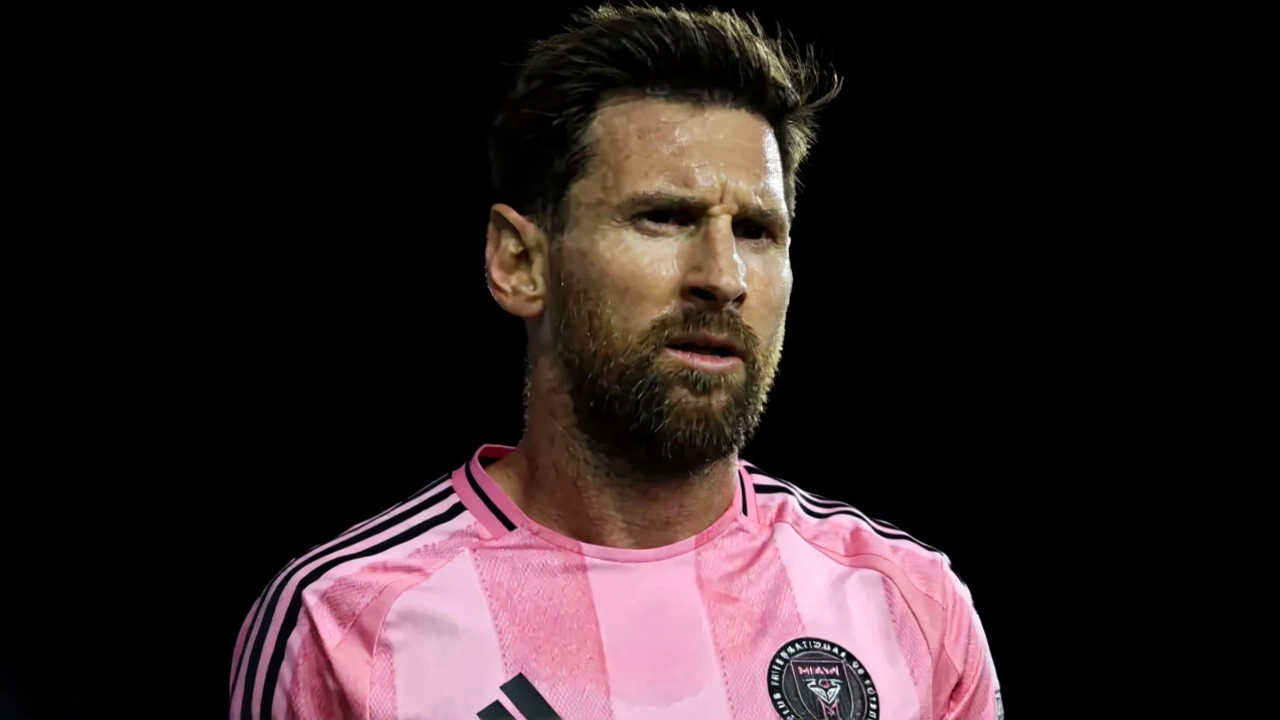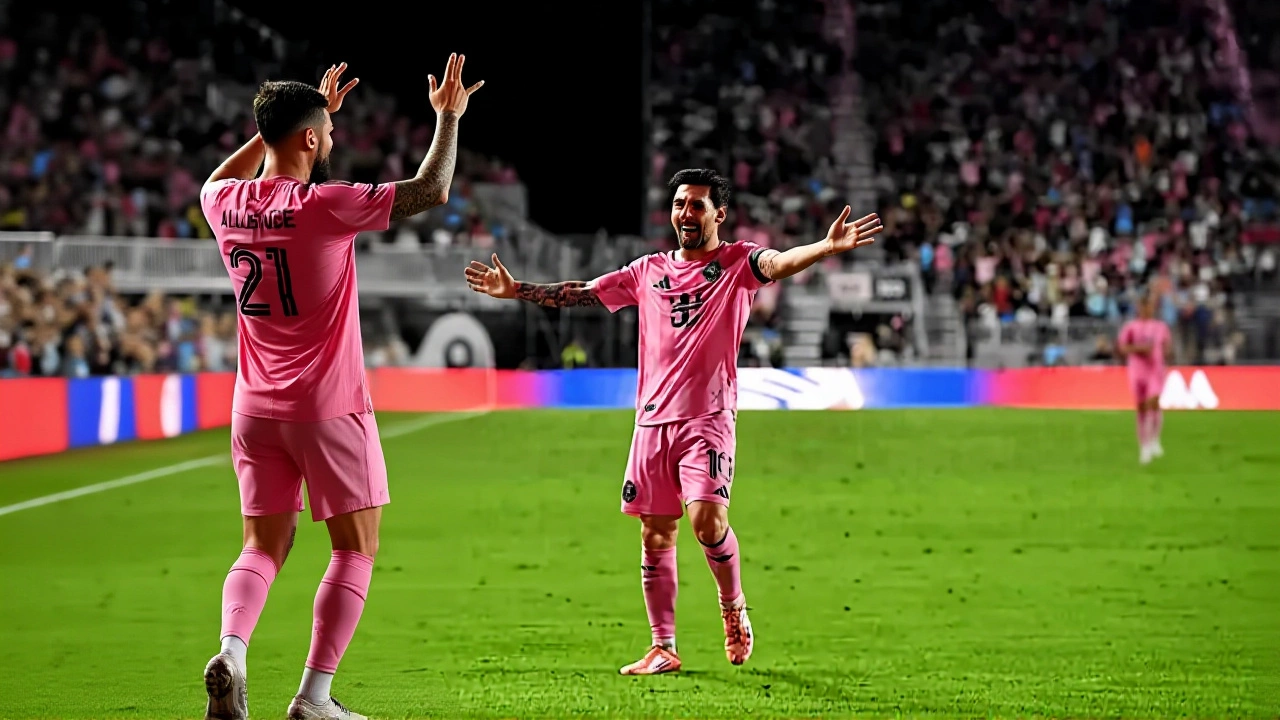When Lionel Messi headed home the opening goal in the 19th minute, few at TQL Stadium expected what came next. Three assists. Three more goals. A postseason record shattered. On Sunday, November 23, 2025, Inter Miami CF crushed FC Cincinnati 4-0 in the Audi 2025 MLS Cup Playoffs Eastern Conference SemifinalCincinnati, Ohio, sending the home team home and launching Messi into MLS history. His single-game tally — one goal, three assists — pushed his playoff goal contributions to 12 (6 goals, 6 assists), the most ever in a single MLS postseason. It wasn’t just a performance. It was a statement.
How Messi Broke the Record
It started with a simple cross from the left flank. Messi, drifting inside from the right, timed his leap perfectly to meet the ball just inside the six-yard box. The header was firm, low, and past FC Cincinnati goalkeeper Alec Kann. The crowd of 26,183 — a sellout — fell silent. Then, in the second half, he turned playmaker. A perfectly weighted pass split the defense for Mateo Julián Silvetti to slot home in the 57th. Two minutes later, Messi slipped a through-ball between two defenders that Tadeo Allende buried. By the 74th minute, Allende completed his brace after Messi’s third assist — a disguised chip over the top that landed perfectly on the striker’s chest. No one in MLS had ever recorded four direct contributions in a single playoff game. And no one had ever hit 12 total in a postseason.
The Venue That Couldn’t Hold Him
This was Messi’s third match at TQL Stadium. The first, on July 16, 2025, ended in a 3-0 win for FC Cincinnati — their only victory over Inter Miami CF in the last 12 meetings. The second, in the 2023 U.S. Open Cup semifinals, ended with Messi lifting the trophy after a 2-1 win. But this? This was different. He hadn’t scored here before. Not once. Until now. The stadium, located at 1501 Central Parkway, had become a kind of personal challenge. Now, it’s a monument to his dominance. The crowd, once raucous, was left stunned. Some fans left early. Others stood, clapping.
Inter Miami’s Offensive Surge
Inter Miami CF didn’t just win — they exploded. They’ve scored three or more goals in nine of their last 11 games, the highest-scoring stretch in MLS this season. Messi wasn’t the only one on fire. Silvetti, a 21-year-old Argentine midfielder, scored his first two MLS goals in this game. Allende, a 20-year-old academy product, became the youngest player in club history to score twice in a playoff match. Coach Gerardo Martino’s system, built around Messi’s movement and vision, is now the league’s most feared. They’ve scored 42 goals in their last 12 games. Only once in MLS history has a team averaged more than 3.5 goals per game over a 12-game span — and that was Barcelona in 2009. This is the closest MLS has come to replicating it.
FC Cincinnati’s Season Ends in Silence
FC Cincinnati had hoped to build on their surprising 2024 playoff run. They entered the game with momentum — three wins in their last four matches, including a 2-1 upset over New York City FC in the first round. But their defense, which had held firm under pressure all season, collapsed under Messi’s weight. Midfielder Luca Petrasso admitted after the match: “We knew he’d be dangerous. We just didn’t know how much.” The club’s 2025 campaign ended with a whimper — a 4-0 home loss in the conference semifinals. Their season record: 16 wins, 10 draws, 8 losses. They finished third in the Eastern Conference. Now, they face a long offseason trying to figure out how to stop the inevitable.

What’s Next for Inter Miami
Inter Miami CF advances to face either the Philadelphia Union or New York City FC in the Eastern Conference Final, set for the weekend of November 30, 2025. If they win, they’ll host the MLS Cup final on December 6, 2025, at Chase Stadium in Fort Lauderdale, Florida — a venue that has become their fortress. The Western Conference final will determine their opponent: either Vancouver Whitecaps FC, who edged LAFC on penalties, or the winner of San Diego FC vs. Minnesota United FC, scheduled for November 24. No matter who they face, Inter Miami enters as the clear favorite. And no matter who they face, they’ll have Messi.
Why This Matters Beyond the Pitch
This isn’t just about goals or trophies. It’s about legacy. Messi is now the first player in MLS history to record 6+ goals and 6+ assists in a single postseason. He’s the first to reach double-digit goal contributions in a playoff run. He’s also the first to score in every round of the playoffs this year. In a league often criticized for lacking star power, he’s redefining what’s possible. His presence has already lifted MLS TV ratings by 47% this postseason, according to Nielsen. Merchandise sales for Inter Miami CF have surged 310% since the playoffs began. And now, with the final looming, the entire league is watching — not just for the trophy, but to see if anyone can ever match this.
Frequently Asked Questions
How does Messi’s 12-goal contribution record compare to previous MLS playoff records?
Before Messi’s 2025 performance, the record was 10 goal contributions — held jointly by Carlos Vela (2019) and Diego Valeri (2015), each with 5 goals and 5 assists. Messi’s 6 goals and 6 assists not only broke that mark, but did so by a full 20% margin. No other player in MLS history has ever reached six goals and six assists in a single postseason, making this a benchmark that may stand for decades.
Why did FC Cincinnati struggle to contain Messi despite previous success against him?
In their July 2025 win at TQL Stadium, FC Cincinnati used a high press and crowded midfield to disrupt Messi’s rhythm. But in the playoffs, Inter Miami adjusted — they played with more width, used overlapping fullbacks to stretch the defense, and allowed Messi to drift into central channels unmarked. The Cincy defense, fatigued from a grueling playoff schedule, couldn’t replicate their earlier intensity.
What’s the significance of Inter Miami hosting the MLS Cup final?
Hosting the final means Inter Miami would play in front of their home crowd at Chase Stadium, which has become a fortress this season with a 9-1-1 home record. Only once since 2018 has the MLS Cup winner not been the home team in the final. With Messi’s drawing power, a home final could set new attendance and viewership records — potentially exceeding 25,000 fans and 5 million TV viewers in the U.S. alone.
Has any other player in MLS history had a similar impact in a single postseason?
No. While stars like Zlatan Ibrahimović and Sebastian Driussi had standout playoff runs, none matched Messi’s combination of goal-scoring, playmaking, and consistency. Even in his prime, Ibrahimović never recorded more than 8 goal contributions in a single postseason. Messi’s 12 is unprecedented — and it’s happening in a league where defensive structures are tighter and physicality is higher than in Europe.
What does this mean for MLS’s global reputation?
Messi’s playoff performance is the most dominant individual display in MLS history, and it’s drawing global attention. European broadcasters have increased live coverage by 60% this postseason. FIFA has reportedly invited MLS to present a case for expanded World Cup qualifying slots, citing Messi’s impact as proof of the league’s rising stature. For the first time, the MLS Cup final might be considered a true global event — not just a domestic trophy.
